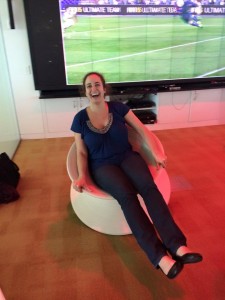By Kelly McNeil
In between taking a spin class, drinking her morning coffee and teaching COM 230, Dr. Emily Winderman can be found working on research involving the midwifery movement.
Dr. Winderman, an assistant professor in the department, began teaching at NC State in August and said, “It’s so wonderful. I love the students. I love my faculty and colleagues — it’s been a really amazing year so far.”
When she completed her undergraduate degree, it was about the time the economy crashed and there weren’t many jobs, so she decided to pursue a master’s degree. It was then she discovered her love for teaching because it combined her performance background with learning.

Dr. Emily Winderman
“I want to be the instructor that people don’t necessarily love at the time because I kind of make their lives a little bit miserable, but I really want to be the person five years from now where they’re like, ‘Wow, I’m so happy I did that,’” Dr. Winderman said. “It’s kind of hard because you want instant gratification — you want all your students to love every minute. But it’s hard to take yourself out of that too.”
Dr. Winderman said she wants to be someone who is rigorous, yet fair and compassionate toward her students. She hopes to strike the balance of being there for them but not letting that spill over into not being accountable for assignments.
When she’s not at NC State teaching, Dr. Winderman is working on several different research projects. Her main research project focuses on the midwifery movement. She studies this through speeches and public addresses because she likes to build history based upon what speech is circulating publicly.
Dr. Winderman is closely studying a woman doctor from the 1890s. “She was already unique because back then the predominately male doctors started the American Medical Association, and they were slowly but surely kicking women out of the domain of childbirth,” she said. “Doctors wouldn’t want to attend to women because it took a long time, and it wasn’t really profitable for them.”
As the AMA started delegitimizing midwives by connecting them to “dirty immigrants,” she took interest in this woman because she was a doctor and not a midwife. Dr. Winderman studied the doctor’s speeches that discussed the surroundings of where women gave birth and her concerns for how unsanitary they were. Unfortunately, she said, what happened was that even though she was leveraging this accusation to both doctors and midwives, the audience at the conference only heard “midwives.”
“One of my projects is closely analyzing that speech to look at why doctors didn’t see themselves as complicit in some of the unsanitary surroundings that women were giving birth in,” she said.
Dr. Winderman decided to focus her research on midwifery because she’s interested in the rhetoric of reproduction and the different ways humans deal with birth in different cultures.
“I’m interested in birth control, to abortion, to midwifery, basically that entire span, to look at how women’s bodies are very closely managed, and in some ways where women resist that imperative to birth on a particular time frame,” she said.
The challenging part about her research is that it’s not linear. She said it isn’t procedural, so it’s difficult knowing when to leave one stage and start on the next stage.
“There’s so much information out there to read,” she said. “I’d say the biggest challenge is setting the limits of when to move on and say, ‘I’ve done enough to start writing.’”
During her research, Dr. Winderman looks at public emotion. She studies speeches through different types of emotion, such as disgust, sympathy, sadness, shame and anger.
Dr. Winderman, who often has her two dogs by her side as she works, said she embodies all the emotions she studies. One night, she couldn’t even bare to do the dishes because her disgust reflex was so strong, and when she studies anger, she feels energized. How she responds to her findings and seeing how the research has practical applications is what she finds most interesting.

